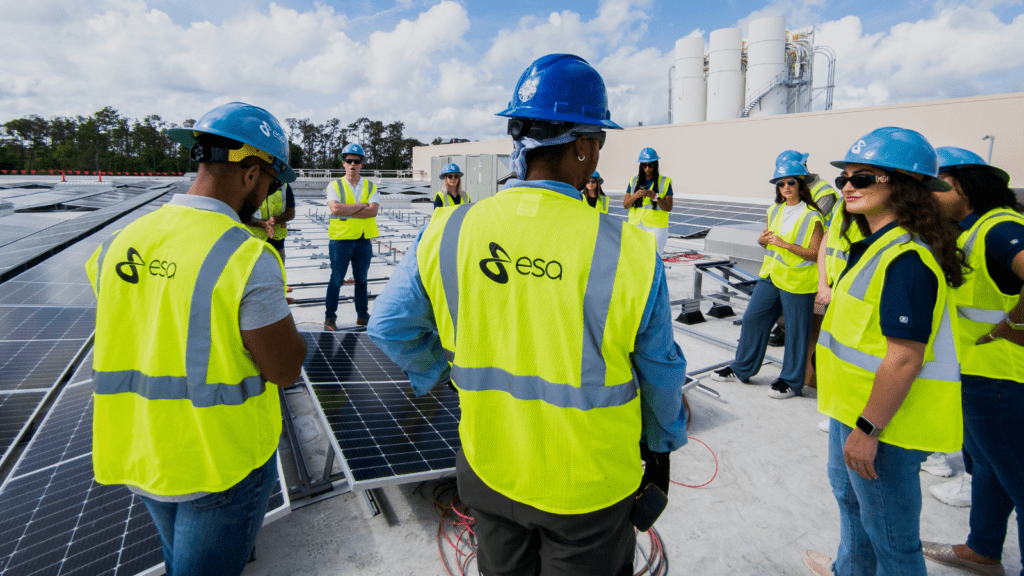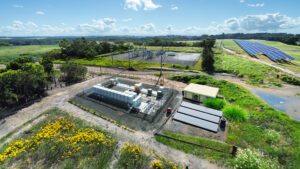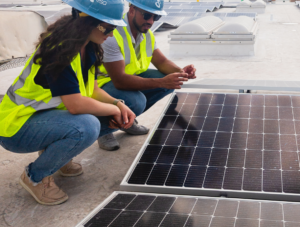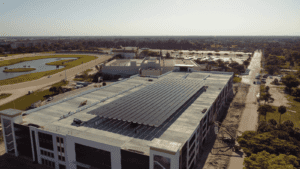Solar energy is no longer just a buzzword like how it was with residential solar panels; it’s now a reality for businesses across the globe. As we move towards a more sustainable future, understanding the potential of commercial solar development is crucial for companies of all sizes.
In this blog post, we will delve into the importance of commercial solar, the different types of installations, key players, permitting processes, and the incentives available. By the end, you’ll know all the benefits of this exciting renewable energy source.
The Importance of Commercial Solar
Commercial solar systems, including commercial solar panels, are an invaluable asset that can help your business save money, reduce its carbon footprint, and contribute to a more sustainable future.
With a record 19 gigawatts of solar projects installed as of June 2022, the commercial solar market is rapidly growing, and businesses are recognizing the rewards of solar energy.
Economic Benefits
Investing in commercial solar panel installation can offer a myriad of financial advantages, such as reducing or even eliminating monthly electricity bills, lowering operating costs, and taking advantage of government, tax credits, and accelerated depreciation for reduced tax liability.
Opting for a commercial solar installation can be a smart decision for businesses looking to go green and save money in the long run by installing solar panels. Commercial solar power systems generate an impressive internal rate of return (IRR) and deliver a competitive payback period.
Environmental Impact
By investing in commercial solar for their commercial and industrial buildings, businesses are making solar energy a more prominent part of the energy mix, helping to reduce greenhouse gas emissions and supporting the transition to a low-carbon economy.
Commercial solar installations on buildings such as self-storage facilities, hospitals, and cold storage facilities save money and contribute to a cleaner environment.
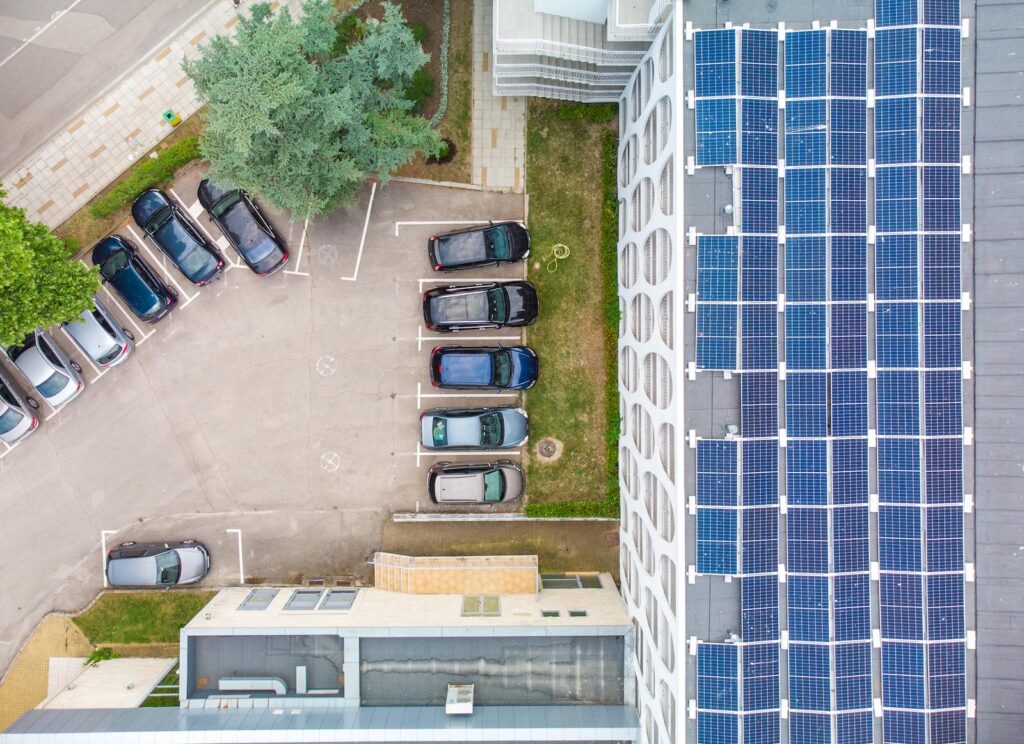
Types of Commercial Solar Projects
Commercial solar can take various forms, ranging from kilowatts to megawatts, and are strategically placed on rooftops, the ground, or shade structures in parking lots or garages. These installations are designed to meet the specific energy needs of each business and maximize their energy efficiency there.
Rooftop Installations
Rooftop installations are a popular choice for businesses with large, flat roofs and minimal shading. By making the most of the available solar space, and minimizing transmission losses, rooftop installations can provide significant energy savings and environmental benefits.
Solar Carports
Solar carports offer a perfect combination of protection and clean energy for businesses. Providing shade and protection for vehicles while generating clean energy, solar carports are an ideal solution for properties with limited rooftop space.
The added benefits of shading and protection for employees’ vehicles make solar carports an attractive choice for businesses looking to invest in solar energy.
Ground-Mounted Systems
Ground-mounted systems are an ideal solution for businesses with ample land, as they can be customized to maximize energy production. These installations offer advantages such as easy access for maintenance and repairs, cooler temperatures compared to roof-mounted systems, and no concerns about roof leakage.
Key Players in Commercial Solar Development
Developing a successful commercial solar project involves collaboration among various key players, including developers, contractors, and financiers. These professionals work together to design, install, and finance solar, ensuring a seamless process from start to finish.
Developers
Developers play a crucial role in commercial solar, assessing the potential by evaluating the site, local regulations, and financial incentives available. They design the solar system to meet the project’s needs, taking into account the size, orientation, and other factors to ensure successful completion.
Developers also manage the permitting process, obtaining zoning approvals, building permits, and interconnection agreements. Their expertise is vital to the overall success of the project.
Contractors
Contractors are responsible for constructing and installing solar power plants, including engineering, design, procuring equipment and materials, and managing the entire project. They work closely with engineers and commercial solar installers to ensure the project meets the highest standards of quality and efficiency.
Financiers
Financiers play a vital role in commercial solar by providing the necessary project funding. They can offer direct lending or collaborate with financial intermediaries to supply the required capital. Financiers can also facilitate leasing arrangements or offer loans to cover upfront costs.
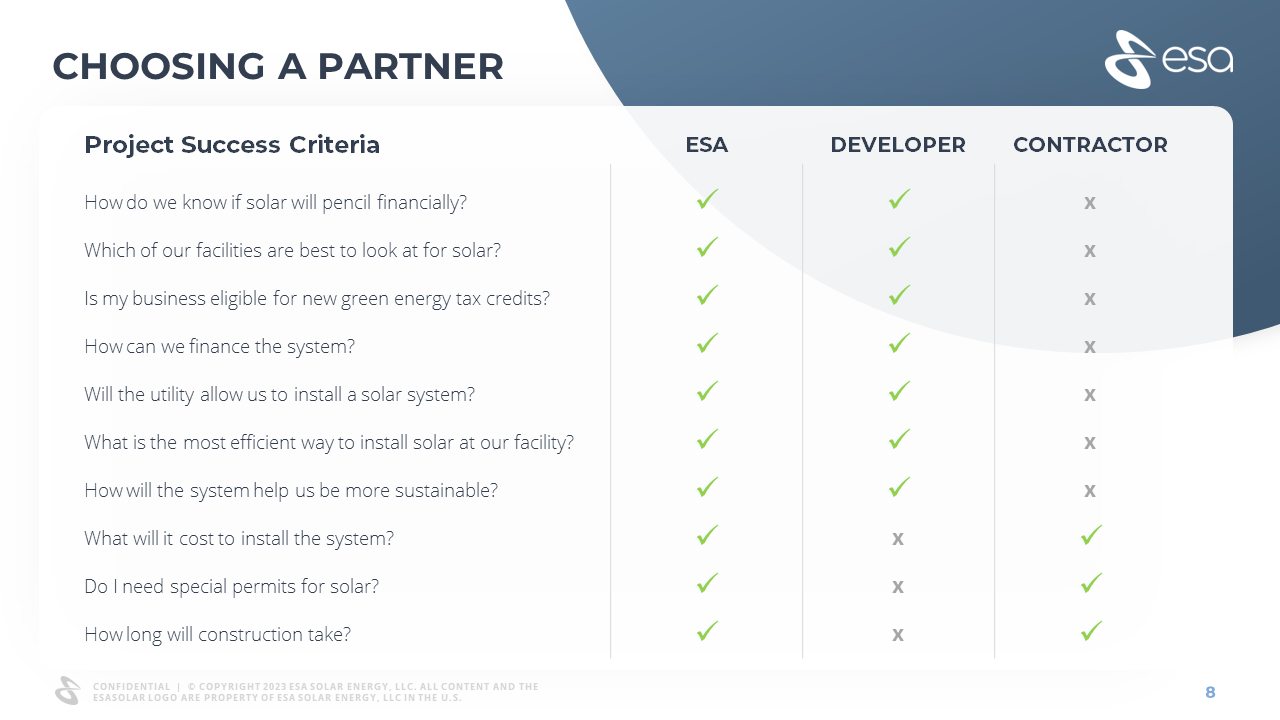
Navigating the Commercial Solar Permitting Process
The commercial solar permitting process is a crucial step in bringing your solar project to life. It involves navigating zoning regulations, obtaining building permits, and securing interconnection agreements with utility companies. Understanding and managing the permitting process can help ensure a smooth and successful solar project.
Zoning Regulations
Zoning regulations determine where solar installations can be built and may impose restrictions on system size or location. Understanding these regulations is essential to ensure that your solar project meets all regulatory requirements and is sustainable, protecting the environment from potential harm.
Building Permits
Building permits are essential documents issued by local governments that certify that a proposed construction project complies with all applicable building codes and other regulations. For commercial solar, essential building permits usually include an electrical permit, a construction or building permit, and a solar permit.
Interconnection Agreements
Interconnection agreements are contracts between a solar system owner and the utility company that outline the terms and conditions for connecting the solar system to the grid and selling excess energy back to the utility.
These agreements can include system size, equipment type, voltage, safety requirements, and the rate at which the utility will purchase any excess energy generated.
Maximizing Commercial Solar Incentives and Rebates
To further boost the ROI of your commercial solar project, it’s essential to maximize available incentives and rebates. These financial benefits for commercial installation come from federal, state, and utility-level programs and can help offset the upfront costs of solar installations.
By working with experienced solar contractors, you can ensure the success of your solar project and take full advantage of these incentives.
Federal Incentives
The Inflation Reduction Act (IRA) is a game changer for businesses looking to cut costs, reduce reliance on fossil fuels, and support clean energy with solar power. This law has huge implications for US clean energy projects, with $369 billion in federal incentives—the largest ever climate investment by the government. It aims to reduce carbon emissions by 40% by 2030.
The ITC, as a tax credit, allows your company to deduct a portion of the cost of your new solar system that you would otherwise have to pay the federal government in corporate income taxes. The IRA grants a 30% tax credit to independent energy storage installations.
Solar power projects that qualify for the full 30% tax credit can raise their tax credit by 10% by confirming that all steel, iron, or manufactured goods used in the facility were manufactured in the United States.
State-Level Programs
State-level programs offer utility providers additional financial incentives, such as rebates, grants, or low-interest loans, to encourage commercial solar. These programs vary by state and utility companies but can provide valuable financial support for businesses looking to invest in solar energy.
Payback Period
Payback periods, or the time it takes for energy savings to cover the initial investment, can vary depending on the specific project and financial incentives. A typical payback period for commercial solar projects ranges from 3 to 10 years, providing an appealing opportunity for businesses to save money and reduce their carbon footprint.
Common Questions About Commercial Solar Development
Are commercial solar farms profitable?
Commercial solar farms can be highly profitable, with an average annual profit of $21,250 to $42,500 per acre, according to 8 billiontrees. In addition, many solar farms pay off their system within five to ten years and generate free electricity for at least 30 years thereafter.
What are the main advantages of commercial solar for businesses?
Commercial solar offers businesses numerous advantages, such as cost savings, environmental sustainability, and energy independence – making it a smart choice for any business.
Solar energy is becoming increasingly popular as businesses look for ways to reduce their energy costs and become more environmentally friendly. With the cost of solar energy dropping, businesses can now take advantage of the savings and environmental benefits that solar energy provides.
